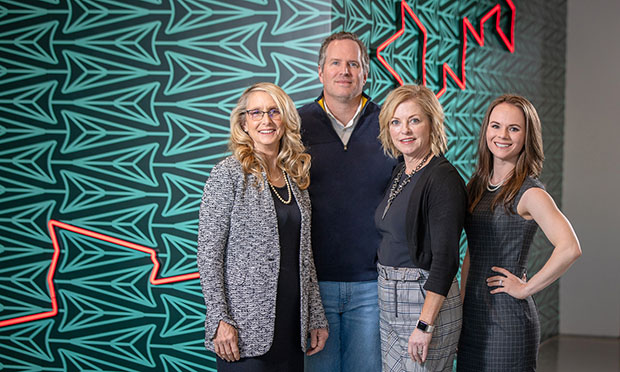Most Innovative Public Company Legal Department of the Year: NetApp
"We are constantly evolving how we work and looking for ways to work more efficiently, invest our resources wisely (whether through fixed-fee arrangements, redesigning processes or leveraging impactful technology), and to lead the way on important topics like diversity and wellness," says GC Matt Fawcett.
November 05, 2019 at 11:30 AM
4 minute read
 (L to R) Connie Brenton, Director of Legal Operations, General Counsel Matt Fawcett; Elizabeth O'Callahan VP legal; Emily Teuben, Senior Legal Operations Manage. (Photo: Jason Doiy/ALM)
(L to R) Connie Brenton, Director of Legal Operations, General Counsel Matt Fawcett; Elizabeth O'Callahan VP legal; Emily Teuben, Senior Legal Operations Manage. (Photo: Jason Doiy/ALM)
The in-house legal department at cloud services and storage company NetApp harnessed Robotic Process Automation to reduce contract processing time from 15 minutes to 2.5 minutes, freeing up half a full-time equivalent position to do more complex work. NetApp's legal team also saved more than $4 million through the use of workflow automation technology. GC Matt Fawcett also became a leading in-house voice in the ongoing discussion about mental health issues in the legal profession.
That combination of factors landed NetApp the honor of being named Most Innovative Public Company Legal Department of the Year as part of The Recorder's California Leaders in Tech Law and Innovation Awards. The Recorder recently caught up with Fawcett to discuss the in-house legal team's increasing use of technology.
The Recorder: What are the distinguishing characteristics of your in-house legal department at NetApp and the lawyers and staff that make it up?
Matt Fawcett: The NetApp Legal Department is composed of serial innovators and beta testers of new technology. We have gone from using three technologies in 2011 to using 23 technologies in 2019, half of them being added in the last three years.
We are constantly evolving how we work and looking for ways to work more efficiently, invest our resources wisely (whether through fixed-fee arrangements, redesigning processes or leveraging impactful technology), and to lead the way on important topics like diversity and wellness.
Over the past year, we were the first department at NetApp (after IT) to use Robotic Process Automation (RPA). We leveraged it in the contracting sphere to reduce agreement processing time from 15 minutes to 2.5 minutes, freeing up staff for more complex work. Additionally, we saved over $4M USD in 2018 via TAP workflow automation technology, with over 50 use cases, enterprisewide.
Finally, although we are a geographically disparate team, we make it a priority to build and maintain connectivity and community. We host a variety of meetings in Europe, Asia and the U.S., and frequently bring remote colleagues to our Sunnyvale HQ.
What was the biggest challenge your in-house team faced in the past year and how did you overcome it?
Our industry (enterprise IT) is transforming quickly, at a time where geopolitical instability is increasingly the norm and the regulatory landscape is unpredictable. Our challenge is to help the company navigate this landscape by anticipating changes, creating new tools and solutions to accelerate business and evolve risk mitigation strategies against this backdrop. Some of the ways we are addressing these challenges include the establishment of a government relations function, the formation of a Global Legal Shared Services organization to focus on delivering friction-free tools for commercial work and the creation of a Privacy Evangelist to educate customers, partners and our teams on this pressing issue.
Besides that challenge, what was your legal department's most significant accomplishment of the past year and why?
The continued use of legal technology. The members of the NetApp Legal department are comfortable with (and expectant of) the use of technology; with the continued advancement of technology, the Legal department is able to leverage these opportunities to provide value, enable the business and deliver superior service.
This content has been archived. It is available through our partners, LexisNexis® and Bloomberg Law.
To view this content, please continue to their sites.
Not a Lexis Subscriber?
Subscribe Now
Not a Bloomberg Law Subscriber?
Subscribe Now
NOT FOR REPRINT
© 2025 ALM Global, LLC, All Rights Reserved. Request academic re-use from www.copyright.com. All other uses, submit a request to [email protected]. For more information visit Asset & Logo Licensing.
You Might Like
View All
Kraken’s Chief Legal Officer Exits, Eyes Role in Trump Administration
3 minute read

Collectible Maker Funko Wins Motion to Dismiss Securities Class Action

How Tony West Used Transparency to Reform Uber's Toxic Culture
Trending Stories
- 1Uber Files RICO Suit Against Plaintiff-Side Firms Alleging Fraudulent Injury Claims
- 2The Law Firm Disrupted: Scrutinizing the Elephant More Than the Mouse
- 3Inherent Diminished Value Damages Unavailable to 3rd-Party Claimants, Court Says
- 4Pa. Defense Firm Sued by Client Over Ex-Eagles Player's $43.5M Med Mal Win
- 5Losses Mount at Morris Manning, but Departing Ex-Chair Stays Bullish About His Old Firm's Future
Who Got The Work
J. Brugh Lower of Gibbons has entered an appearance for industrial equipment supplier Devco Corporation in a pending trademark infringement lawsuit. The suit, accusing the defendant of selling knock-off Graco products, was filed Dec. 18 in New Jersey District Court by Rivkin Radler on behalf of Graco Inc. and Graco Minnesota. The case, assigned to U.S. District Judge Zahid N. Quraishi, is 3:24-cv-11294, Graco Inc. et al v. Devco Corporation.
Who Got The Work
Rebecca Maller-Stein and Kent A. Yalowitz of Arnold & Porter Kaye Scholer have entered their appearances for Hanaco Venture Capital and its executives, Lior Prosor and David Frankel, in a pending securities lawsuit. The action, filed on Dec. 24 in New York Southern District Court by Zell, Aron & Co. on behalf of Goldeneye Advisors, accuses the defendants of negligently and fraudulently managing the plaintiff's $1 million investment. The case, assigned to U.S. District Judge Vernon S. Broderick, is 1:24-cv-09918, Goldeneye Advisors, LLC v. Hanaco Venture Capital, Ltd. et al.
Who Got The Work
Attorneys from A&O Shearman has stepped in as defense counsel for Toronto-Dominion Bank and other defendants in a pending securities class action. The suit, filed Dec. 11 in New York Southern District Court by Bleichmar Fonti & Auld, accuses the defendants of concealing the bank's 'pervasive' deficiencies in regards to its compliance with the Bank Secrecy Act and the quality of its anti-money laundering controls. The case, assigned to U.S. District Judge Arun Subramanian, is 1:24-cv-09445, Gonzalez v. The Toronto-Dominion Bank et al.
Who Got The Work
Crown Castle International, a Pennsylvania company providing shared communications infrastructure, has turned to Luke D. Wolf of Gordon Rees Scully Mansukhani to fend off a pending breach-of-contract lawsuit. The court action, filed Nov. 25 in Michigan Eastern District Court by Hooper Hathaway PC on behalf of The Town Residences LLC, accuses Crown Castle of failing to transfer approximately $30,000 in utility payments from T-Mobile in breach of a roof-top lease and assignment agreement. The case, assigned to U.S. District Judge Susan K. Declercq, is 2:24-cv-13131, The Town Residences LLC v. T-Mobile US, Inc. et al.
Who Got The Work
Wilfred P. Coronato and Daniel M. Schwartz of McCarter & English have stepped in as defense counsel to Electrolux Home Products Inc. in a pending product liability lawsuit. The court action, filed Nov. 26 in New York Eastern District Court by Poulos Lopiccolo PC and Nagel Rice LLP on behalf of David Stern, alleges that the defendant's refrigerators’ drawers and shelving repeatedly break and fall apart within months after purchase. The case, assigned to U.S. District Judge Joan M. Azrack, is 2:24-cv-08204, Stern v. Electrolux Home Products, Inc.
Featured Firms
Law Offices of Gary Martin Hays & Associates, P.C.
(470) 294-1674
Law Offices of Mark E. Salomone
(857) 444-6468
Smith & Hassler
(713) 739-1250






